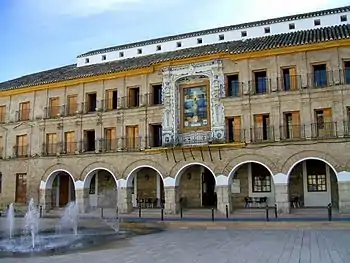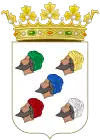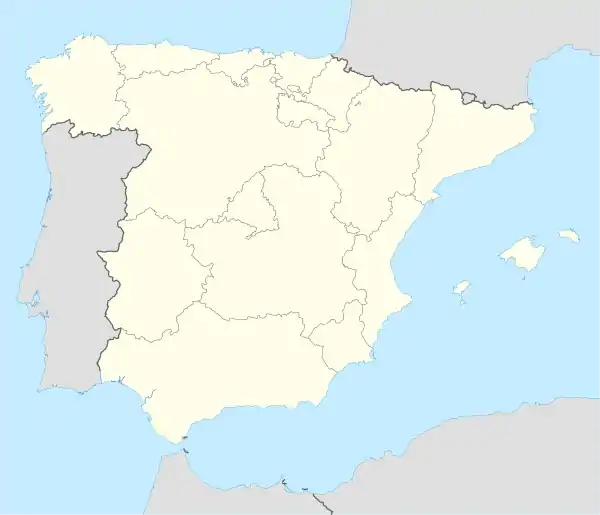Baena
Baena is a town of Andalucia in the province of Córdoba in southern Spain. It is situated near the river Marbella on the slope of a hill 52 kilometres (32 mi) southeast of Córdoba by road. The population of the town is 20,266 (2012).
Baena | |
|---|---|
 Casa del Monte, Baena | |
.svg.png.webp) Flag  Coat of arms | |
 Baena Location in Spain | |
| Coordinates: 37°37′10″N 4°19′34″W | |
| Country | |
| Autonomous Community | |
| Province | Córdoba |
| Comarca | Campiña de Baena |
| Government | |
| • Mayor | María Jesús Serrano Jiménez (PSOE) |
| Area | |
| • Total | 362.5 km2 (140.0 sq mi) |
| Elevation (AMSL) | 405 m (1,329 ft) |
| Population (2018)[1] | |
| • Total | 19,338 |
| • Density | 53/km2 (140/sq mi) |
| Time zone | UTC+1 (CET) |
| • Summer (DST) | UTC+2 (CEST (GMT +2)) |
| Postal code | 14850 |
| Area code(s) | +34 (Spain) + 957 (Córdoba) |
| Website | Town Hall |
History
The site of the Roman town (Baniana or Biniana)[2] could still be traced as late as the First World War, with various Roman antiquities excavated from the site.[3] In 1833, a subterranean vault was discovered, containing twelve cinerary urns with inscriptions commemorating members of the Pompeian family.[2]
The hill is crowned by fortifications. In 1292, the Moors under Mahommed II of Granada vainly besieged the citadel, which was held for Sancho IV of Castile;[3] the five Moorish heads in its coat-of-arms commemorates the occasion.[2] The castile was a base for Gonzalo de Cordova and was held in the 19th century by the Altamira family.[2] At that time, it held four parish churches and three schools conducted by sisters of charity. The girls' school held a high reputation in its province, despite not going beyond reading, writing, arithmetic, and religious instruction.[2] Its population was around 12,000 in the 1870s[2] and 15,000 by the turn of the century.[3] Grain and olive oil were the principal articles of commerce in the 19th century;[2] by the time of the First World War, horse-breeding and linen-weaving had also developed, despite the nearest railroad station being at Luque.[3]
At the beginning of the Spanish Civil War the town was the scenario of the Baena Massacre, a ruthless mass-execution of Spanish republicans where about 700 loyalists were murdered by the orders of rebel Colonel Sáenz de Buruaga.[4][5][6] Other estimates mention up to 2,000 victims following the brutal repression in Baena.[7]
High-quality olive oil continues to be the mainstay of the local economy. Sierras Subbéticas Natural Park is located to the south of the town.
Notable residents
Notes
- Municipal Register of Spain 2018. National Statistics Institute.
- EB (1878).
- EB (1911).
- Sevilla FC Forum
- The massacre of Baena Archived 2015-09-24 at the Wayback Machine
- Paul Preston (2012). The Spanish Holocaust. New York: W. W. Norton & Company. ISBN 0-393-06476-X.
- No solo corrieron rios de sangre en Badajoz
References
- Baena at andalucia.com
- Baynes, T. S., ed. (1878), , Encyclopædia Britannica, 3 (9th ed.), New York: Charles Scribner's Sons, p. 229.
- Chisholm, Hugh, ed. (1911), , Encyclopædia Britannica, 3 (11th ed.), Cambridge University Press, p. 191.